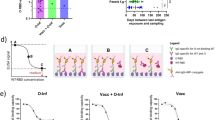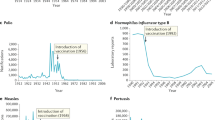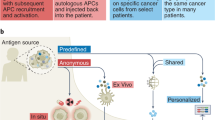Abstract
Recent studies have identified and characterized a ring-infected erythrocyte surface antigen (RESA) of the human malaria parasite Plasmodium falciparum with a relative molecular mass (Mr) of ∼155,000 (refs 1–7). RESA is localized in the micronemes of merozoites and also the membrane of red cells infected with ring-stage parasites. It is thought to be released through the apical pore from the rhoptry at the time of merozoite invasion5. Because antibodies directed against this antigen strongly inhibit parasite growth in vitro, RESA may be useful in developing a vaccine against this parasite4,5,7 Here we describe an immunization trial using Aotus monkeys and Escherichia coli-derived fused polypeptides corresponding to various regions of the RESA molecule. Some monkeys in all test groups, but not in the control group, were protected against overwhelming infection. Strikingly, protection correlated with antibody responses to either of two different repetitive sequences in RESA.
This is a preview of subscription content, access via your institution
Access options
Subscribe to this journal
Receive 51 print issues and online access
$199.00 per year
only $3.90 per issue
Buy this article
- Purchase on Springer Link
- Instant access to full article PDF
Prices may be subject to local taxes which are calculated during checkout
Similar content being viewed by others
References
Perlmann, H. et al. J. exp. Med. 159, 1686–1704 (1984).
Cowman, A. F. et al. Molec. Biol. Med. 2, 207–221 (1984).
Coppel, R. L. et al. Nature 210, 789–792 (1984).
Wahlin, B. et al. Proc. natn. Acad. Sci. U.S.A. 81, 7912–7916 (1984).
Brown, G. V. et al. J. exp. Med. 162, 774–779 (1985).
Wahlgren, M., Björkman, A., Perlmann, H., Berzins, K. & Perlmann, P. Am. J. trop. Med. Hyg. 35, 22–29 (1986).
Berzins, K. et al. Proc. natn. Acad. Sci. U.S.A. 83, 1065–1069 (1986).
Collins, W. E. et al. J. Parasitol. 69, 186–190 (1983).
Campbell, C. C., Collins, W. E., Milhous, W. K., Roberts, J. M. & Armstead, A. Am. J. trop. Med. Hyg. 35, 472–475 (1986).
James, M. A., Kakoma, I., Ristic, M. & Cagnard, M. Infect. Immun. 49, 476–480 (1985).
Earle, W. C. & Perez, M. J Lab. clin. Med. 17, 1124–1130 (1931).
Sanger, F., Nicklen, S. & Coulson, A. R. Proc. natn. Acad. Sci. U.S.A. 74, 5463–5467 (1977).
Anders, R. F. et al. Molec. Biol Med. 2, 177–191 (1984).
Author information
Authors and Affiliations
Rights and permissions
About this article
Cite this article
Collins, W., Anders, R., Pappaioanou, M. et al. Immunization of Aotus monkeys with recombinant proteins of an erythrocyte surface antigen of Plasmodium falciparum. Nature 323, 259–262 (1986). https://doi.org/10.1038/323259a0
Received:
Accepted:
Issue Date:
DOI: https://doi.org/10.1038/323259a0
This article is cited by
-
Specific expression and export of the Plasmodium falciparum Gametocyte EXported Protein-5 marks the gametocyte ring stage
Malaria Journal (2015)
-
Identification, classification and evolution of Owl Monkeys (Aotus, Illiger 1811)
BMC Evolutionary Biology (2010)
-
Circulating stable antigens at higher levels down-regulate antibody responses toPlasmodium falciparum
Parasitology Research (1993)
-
Malaria vaccine
Experientia (1991)
-
Studies on Pf155/RESA and other soluble antigens from in vitro culturedPlasmodium falciparum
Parasitology Research (1991)
Comments
By submitting a comment you agree to abide by our Terms and Community Guidelines. If you find something abusive or that does not comply with our terms or guidelines please flag it as inappropriate.



